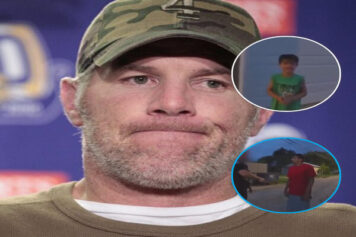Brain trauma and diseases are something the NFL, one of the largest grossing companies in the world, doesn’t like to talk about. The league has made rules changes over the years —most recently the new hybrid kickoff rule — to limit collisions and concussions to players.
In response to these necessary, but game-altering changes, some purists have complained that the NFL is becoming more like flag football, but the warriors of yesterday, such as Brett Favre, who probably played way longer than he should have, are still suffering the sad aftereffects of the fame, fortune and glory that has defined their careers.
Brett Favre Announces He Has Parkinson’s Disease
The Hall of Fame quarterback, who threw for 71, 838 yards and 508 TDs in his 20-year career, disclosed during a congressional hearing on Tuesday that he was recently diagnosed with Parkinson’s disease, a degenerative nervous system disorder that causes parts of the brain to deteriorate and affects movement.
Speaking before the House Ways and Means Committee, Favre spoke about Prevacus, a company developing a concussion drug that received $2 million of Temporary Assistance for Needy Families (TANF) funds.
Favre was the top investor in Prevacus and text messages show he began asking state officials for help securing funds for the company in November 2018.
How ironic that funds that Favre was accused of stealing from needy families in Mississippi to help fund a volleyball team also were used for what Favre now paints as a heroic effort to help treat NFL players affected by concussions.
While speaking at the congressional hearing Favre said:
“Sadly, I also lost an investment in a company that I believed was developing a breakthrough concussion drug I thought would help others,” Favre said during opening remarks. “And I’m sure you’ll understand why it’s too late for me, because I’ve recently been diagnosed with Parkinson’s. This is also a cause dear to my heart.”
Prevacus’ founder, Jacob VanLandingham already pleaded guilty to wire fraud in July, admitting that he egregiously used Mississippi welfare money to pay off gambling and other debts.
Favre got caught up in the case, though he wasn’t criminally charged, his reputation took a hit.
Brett Favre Addresses Involvement In Mississippi Welfare Fraud Case
He addressed his involvement in the sprawling Mississippi welfare case where at least $77M in TANF funds, earmarked for poor families, were diverted to the rich and powerful, according to a 2019 Mississippi state audit.
The Hall of Fame quarterback was one of the original 38 defendants named in a civil lawsuit filed by the Mississippi Department of Human Services (MDHS) seeking to recoup Temporary Assistance for Needy Families (TANF) funds.
At the heart of the dispute between MDHS and Favre is a volleyball facility built in 2019 at Favre’s alma mater, the University of Southern Mississippi.
Favre donated his own money and helped raise funds for the facility, and text messages, which have become public in legal filings as part of the civil lawsuit, show he urged state officials for funding during the time his daughter was on the team. The university’s athletic foundation received $5 million in TANF funds.
Now it seems Favre has much bigger problems. Problems that were all too predictable and don’t come as a shock to anyone that saw Favre play with reckless abandon in an era of football that still allowed for quarterbacks to be mutilated by defenders.
CTE and Brain Diseases Rampant In Retired and Current Players
In 2016, the NFL publicly acknowledged for the first time a connection between football and CTE. In June 2015, a federal judge approved a class-action lawsuit settlement between the NFL and thousands of former players, providing up to $5 million per retired player for serious medical conditions associated with repeated head trauma.
According to CNN.com, chronic traumatic encephalopathy, known as CTE, was found in 99% of deceased NFL players’ brains that were donated to scientific research,” according to a study published in Journal of the American Medical Association.
Related: Aaron Hernandez CTE Discovery May Offer Perspective On His Tragic Life (theshadowleague.com)
In the summer of 2017, researchers at Boston University studied the brains of 202 former high school, college and professional football players after they died and found CTE in 177 of them. The NFL said little about the matter and somebody seemed to put the muzzle on Boston University, which said it would have no further statement on its findings.
In July of 2021, researchers at Boston University released findings that showed that they discovered CTE in the brains of 110 of the 111 former NFL players they had examined. It was also found in three of the 14 high school players and 48 of the 53 college players. The study included brains of individuals and former NFL stars who have been publicly confirmed to have had the disease.
Brett Favre Has Possibly 1,000s Of Concussions
According to reports, when asked in a 2018 interview how many concussions he suffered, Favre, 54, said he knows of only “three or four” but believed he could have suffered more than 1,000 concussions during his long NFL career.
“When you have ringing of the ears, seeing stars, that’s a concussion,” Favre told the “Today” show. “And if that is a concussion, I’ve had hundreds, maybe thousands, throughout my career, which is frightening.”
Favre is not the only NFL star to suffer from the effects of brain disease after retirement.
Hall of Fame defensive lineman Warren Sapp, now a coach on Deion Sanders’ Colorado Buffaloes staff, revealed his cognitive struggles.
In a phone interview with the Tampa Bay Times Sapp said that he forgot the directions to a friend’s house in Miami and couldn’t remember where it was located.
“I wish you could’ve been there and looked into my eyes because it was the scariest thing. I can rip and run on every road in this city and do whatever I want to do. I’m telling you, it was the scariest moment of my life.
Former Washington Redskins Hall of Fame defensive end Charles Mann says if he could do it all again, he would never play in the NFL.
From 1983-93, the physically imposing Mann helped lead the franchise to two of its three Super Bowl wins. The former Nevada Wolfpack star retired second all-time in franchise career sacks with 83.
In a 2023 appearance on ”The Sports Junkies 106.7 FM The Fan,” Mann talked about his career and if he could change it by never setting foot on the gridiron.
“I’m being brutally honest. If I could do it again, I would not have played football.”
Sad news about a football legend, but it happens far too often and is a problem the NFL will always have to deal with and one that will create more holdouts and contract disputes as players deal with the realities of life after football.



